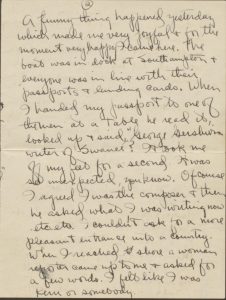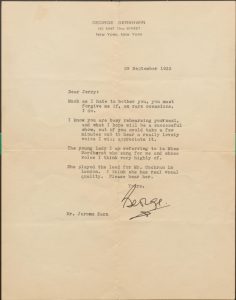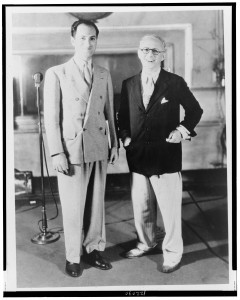George Gershwin found success in his music. But earlier on in his career, he looked up to a fellow musician, Jerome Kern. Kern was a musical theater composer who Gershwin idolized. While looking further into their relationship, Gershwin started out as an accompanist for Kern, and composed on the side. Gershwin wanted to compose a full length musical, but Kern kindly told Gershwin to avoid  composing full musicals until later in his career. Having heard what Kern said, Gershwin immediately composed his first musical theater piece, La-La-Lucille. His success soon became more widespread, as did his appeal. In 1923, Gershwin writes a letter to his brother, Ira Gershwin, in which he describes an interaction with a boat worker on the shore of Southampton. The worker recognizes his name, and greets Gershwin, asking about what his next work will be. This moment solidifies Gershwin’s fame in his mind, as he ends his letter to Ira with, “I felt like I was Kern or somebody.“
composing full musicals until later in his career. Having heard what Kern said, Gershwin immediately composed his first musical theater piece, La-La-Lucille. His success soon became more widespread, as did his appeal. In 1923, Gershwin writes a letter to his brother, Ira Gershwin, in which he describes an interaction with a boat worker on the shore of Southampton. The worker recognizes his name, and greets Gershwin, asking about what his next work will be. This moment solidifies Gershwin’s fame in his mind, as he ends his letter to Ira with, “I felt like I was Kern or somebody.“
After around a decade passes, Gershwin sees himself to be of a similar caliber as Kern. The letter that Gershwin sends to Kern in 1933 exemplifies this shift in their relation. Very kindly, Gershwin asks Kern to hear a vocalist. This is a full circle moment. Kern inspired Gershwin, and Gershwin’s ambition changes Kern’s relationship from that of a mentor to that of a colleague.
himself to be of a similar caliber as Kern. The letter that Gershwin sends to Kern in 1933 exemplifies this shift in their relation. Very kindly, Gershwin asks Kern to hear a vocalist. This is a full circle moment. Kern inspired Gershwin, and Gershwin’s ambition changes Kern’s relationship from that of a mentor to that of a colleague.
Work Cited
Letter from George Gershwin to Ira Gershwin, February 18, 1923, 60/61, George and Ira Gershwin Collection, Music Division, Library of Congress.
Letter from George Gershwin to Jerome Kern, September 29, 1933, 136/80, George and Ira Gershwin Collection, Music Division, Library of Congress.
Photograph of George Gershwin with Jerome Kern, 1933, 103/38, George and Ira Gershwin Collection, Music Division, Library of Congress.

